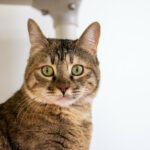 There are times when life feels like quicksand up to our necks.
There are times when life feels like quicksand up to our necks.
There are mornings when it takes all your strength to crawl out of the soil.
These are the hours we must remember Papillon.
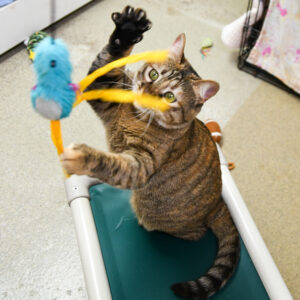 Papillon’s name means “butterfly.” She is as grounded as any land mammal, subject to the same laws of physics as the rest of us. If she has wings, they only exist in her imagination.
Papillon’s name means “butterfly.” She is as grounded as any land mammal, subject to the same laws of physics as the rest of us. If she has wings, they only exist in her imagination.
Incidentally, this is the most important place for wings.
If Papillon were pasta, she would be those jaunty bow-ties with a name that sounds like laughter: farfalle. She is aware that everything good that ever happened to her was far-fetched at first. She is aware that “at first” is only a layover, a flight delay.
Her itinerary began in Beirut, a city that asks courage from creatures big and small. Papillon’s little hazelnut feet navigated a war zone.
She had no wings to fly, so she was given something better. Papillon received mercy, the one force stronger than gravity.
A woman, made of the same soil and circumstances as the rest of us, rose above the rubble to care for one forgotten cat. This is where Papillon got her wild ideas.
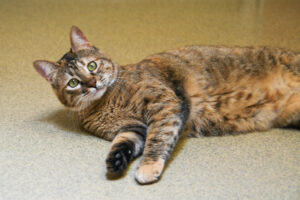 At first, hope never “makes sense.” The world is full of muddy ditches. But there are even more brave arms, there to pull you to a second chance when you are stuck. They may be scarred and trembling. They always seem far-fetched. They never think of themselves as heroes.
At first, hope never “makes sense.” The world is full of muddy ditches. But there are even more brave arms, there to pull you to a second chance when you are stuck. They may be scarred and trembling. They always seem far-fetched. They never think of themselves as heroes.
They are just glad they were there in time, at the one patch of ground where they were needed.
Papillon’s friend cared tenderly for her butterfly. But the day came when the woman’s own wingspan could not reach far enough. Papillon trudged to breakfast with a face full of sores. Something was terribly wrong. Papillon’s rescuer reached out to our friends at Animals Lebanon. If anyone could save her, it was these angels with invisible wings.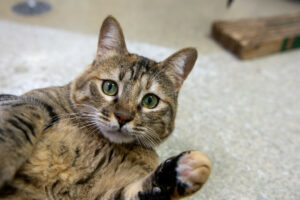
At first, it appeared Papillon was sinking into the long goodbye. Her symptoms resisted treatment, growing worse instead of better.
But it is only when you are earthbound, “hopeless,” that love lends you its own wings.
It may sound far-fetched that a plain brown tabby with a face full of pain should board a steel bird and cross the Atlantic. But things happen every day that are too great and mysterious for Earth.
We have a front-row seat to such things at Tabby’s Place, where we have exiled the word “hopeless” since 2003. Every one of our residents crash-landed here from their own “at first.” Although our arms are wiggly as spaghetti and streaked with dust and tears, we have caught over 4,600 falling stars.
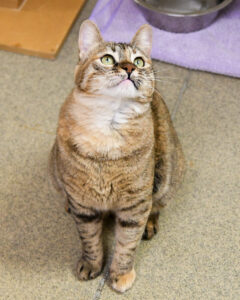 But only one butterfly.
But only one butterfly.
Papillon arrived among the Fab Fourteen, each with their own needs and splendor. But it was quickly apparent that there was something different about the graceful girl with the laughing green eyes. What first looked like a fungal infection was far more savage.
You will not hear the following sentence often: we had never seen this at Tabby’s Place before.
Papillon had leprosy.
At first, the word sent us all to our knees. Leprosy? Our minds roiled with images from Leviticus to Calcutta. How could this be? How could we save her? What could we do, when we are only small animals ourselves, with arms that cannot fly no matter how hard we flap?
To make matters both better and worse, Papillon was blithe and buoyant.
Not one comet of concern streaked her face, though it was pocked with pain. She had imaginary wings, and she wanted to make sure we did, too. She loved us from the first. She loved us more than “made sense.” She loved us from the ocean floor to the moon. She went emotionally airborne for squeeze-treats, kisses, and caresses. She made our hearts soar.
She made our hearts break.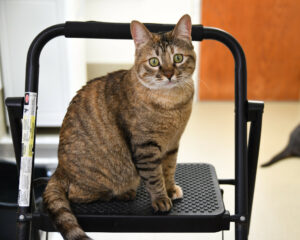
But a broken heart is in the best possible position to turn feisty. Rebellious. Winged.
We were not about to wallow in fear. This was not the time to roll in dust and ash. This was the time for flight.
Our vet team, tireless and tender, abandoned gravity’s suggestions and flew. By the powers of compassion and WiFi, experts descended upon Tabby’s Place from all over the world. For the love of one cat, Australians, Americans, and inhabitants of the planet New Jersey joined forces.
The complexities of Papillon’s case called upon the best minds and softest hearts across continents. Wings peeked out from the lab coats of pathologists and researchers.
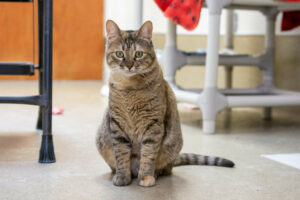 At last, the clouds gave way.
At last, the clouds gave way.
Papillon’s condition was part of the mycobacterium family, and transmitted via soil. She could be cured by a meticulous, failure-is-not-an-option treatment regimen.
It would be a long haul flight: three months, involving a strict isolation protocol. The butterfly would need a room of her own and an extraordinary level of attention. Some people might say it doesn’t “make sense” to do so much for one cat, even if she does love you from the ocean floor to the moon.
We can only hope those people will someday experience flight.
When you have been lifted by love, extraordinary measures are as ordinary as the sunrise. Papillon’s three month treatment flew by quickly. Our staff delivered antibiotics and unconditional love.
Papillon’s lesions vanished, never to return. But her bliss was on the ascent.
If humans are prone to taking goodness for granted, the butterfly did the opposite. Everything good in her life was more astonishing than the day before. Instead of getting used to our affection, she got more excited about it.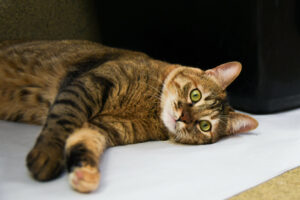
Unlike her now-cured condition, exuberance is infectious.
Imaginary wings may be more real than anything on Earth.
